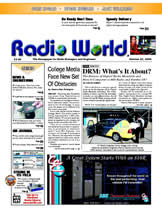
 |
|
|||||||||
|
|
 |
||||||||
 |
Where Have All the Engineers
Gone? by Mark Persons |
Radio
World Article March 14, 2012 |
|
July 9, 2012 e-mail: letters in this latest issue of RW (received just today here in isolated and far distant Avon) in response to your article on the diminishing engineering community were legend, erudite, persuasive ... not to mention 'right on'. Congrats on a job well done. Charles in Avon, Connecticut. May 29, 2012 e-mail: Mark, I just read your article "Where Have All The Engineers Gone?" and it literally brought a tear to my eye. I too am one of those now-gone broadcast engineers that among other positions spent 30 years in television from the era when it was Metromedia until Fox put out the engineers in favor of almost total automation under the control of IT-- not broadcasters. I sometimes feel as if I was one of the last of a dying breed. As far as I can tell, most engineers have been fired and replaced by outside contractors who will charge by the repair rather than being a day to day "cost of doing business." Expertise means nothing to the "suits" and "bean counters" in NYC and elsewhere. Thanks again for a great article. Bill in Saugus, California. May 21, 2012 e-mail: I have been enjoying your articles in Radio World. You last article (this article) was right on target. Danny in Eldorado, Texas. May 21, 2012 e-mail: Mark, Good article in Radio World on "Where have all the engineers gone?" Fred in Lima Ohio. May 21, 2012 e-mail: Hi, Enjoyed you article in RW about "Where Have All the Engineers Gone?" Walt, somewhere in Arizona. May 18, 2012 e-mail: Hi Mark, Good article and right on the mark! Bill in Bemidji, Minnesota. May 17, 2012 e-mail: Good Morning Mark: I enjoyed your latest article in Radio World. That's a good question. It's kind of scary when you think of the local IT guy poking around in the RF section of the transmitter! That would be like me working on the engine in my vehicle...an accident waiting to happen. I guess I never really thought about the fact that an engineer might not own a soldering iron...but I guess that's the way it is in this day of plug-and-play. Maynard in Madison, Minnesota May 17, 2012 e-mail: Hi Mark, I just wanted to say I appreciated your commentary this week in Radio World. You made me stop to realize that engineering is really evolving to a module-swap operation, and the number of engineers who have the skills to dig into equipment, understand it, and repair it, is diminishing. Mentoring new engineers would be a good thing, but the combination of economics and equipment design does make it an uphill battle. John in Washington, DC. May 9, 2012 e-mail: Yo Mark, I always look for your articles in Radio World and they never disappoint. Your article addresses a common radio station question these days when ever I get a call asking me who they can call to fix a transmitter. Jerry in Olympia, Washington. |
See you down the road. I'll leave the soldering iron on for you. Mark Persons, W0MH, is certified by the Society of Broadcast Engineers as a Certified Professional Broadcast Engineer with 33 years experience. From the Radio World,
May 9,
2012
issue:
http://www.radioworld.com/article/where-have-all-the-engineers-gone/213475
|
|
Questions? Email Mark Persons: teki@mwpersons.com |
|